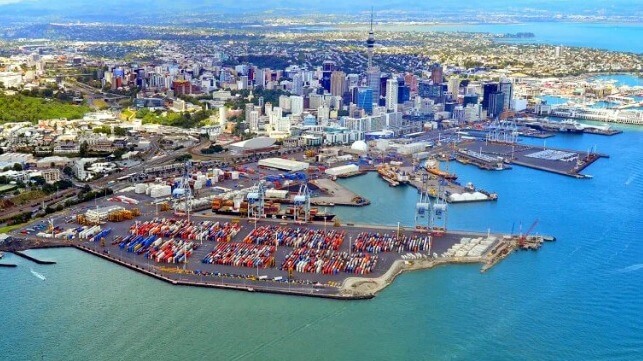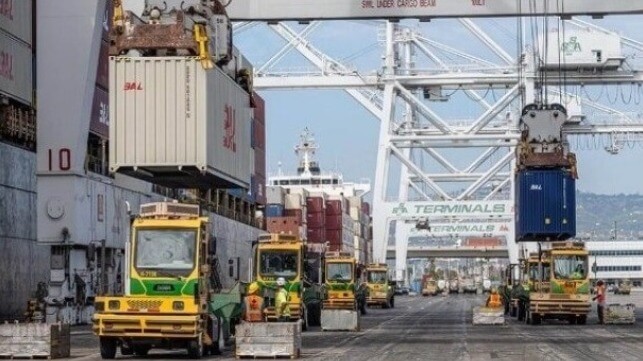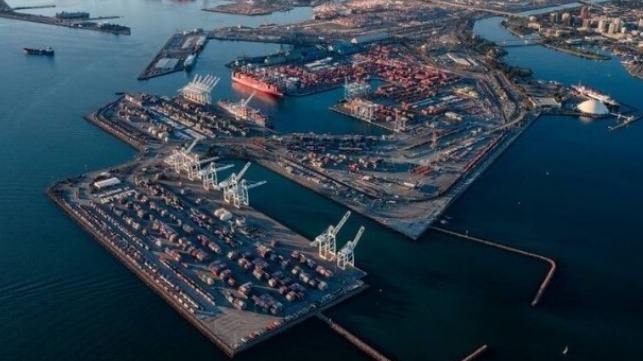Privatization and Relocation of Auckland Port Rejected by Union

The Port of Auckland, New Zealand is facing a new set of challenges as it recovers from four years of operational difficulties. The Maritime Union of New Zealand’s local for Auckland is speaking out against a plan proposed by the City’s mayor to move the port and explore the privatization of its operations.
Elected in October 2022, businessman Wayne Brown ran on a platform that included calling for the redevelopment of Auckland’s waterfront. Immediately after this election, he sent a letter to the chairperson of Ports of Auckland, the port’s operating company, saying that he would call on the Auckland Council to “act more decisively to turn around the port.” In pursuing his position Brown said, “There is no one who voted for me who should have been unaware of my view that car importation and container services should cease at the current site.”
Brown announced at the end of March 2023 that his office is funding a review of Ports of Auckland by a private consulting firm. The mayor briefed the city council and the management of Ports of Auckland on his initiative saying that the review would be focusing on land use plans and exploring the possible sale or “mixed ownership” of the operation. Three elements are being explored including asking if the port could carry out its existing operations on a smaller footprint, seeking interest from investors or port operators for a possible role in the future of the port activity, and how the existing waterfront land could be redeveloped for the benefit of Auckland and its residents.
The Auckland Council looks to use the information from the report as it begins to formulate an updated 10-year plan. Work on the plan is due to start later in 2023 and be finalized by mid-2024.
The Maritime Union local issued a statement rejecting the idea of privatization and saying “There is no need to mess with success.” Maritime Union Branch Secretary Russell Mayn said the confusion around the relocation of the port and now privatization is going to cause more problems for New Zealand’s supply chain security.
“We have seen a major turnaround in performance at Ports of Auckland recently, and we risk undermining this good work,” said Mayn. The union in earlier public statements had also said, “Our view is the Ports of Auckland is now on an extremely promising trajectory …. We need to let the Ports do its job.”
The union points out that the port is not a normal business and by its very nature is a monopoly. The port of Auckland is owned by the city. By world standards, the union admits that it is a small port, but critics point to reports which have consistently cited Auckland as the least efficient port in the region. The World Bank Container Port Performance index ranked Auckland the lowest of 18 ports in Oceania in 2021 while a supply chain analysis by a consulting firm recently said New Zealand companies lose NZ$1.7 billion (US$1 billion) annually to shipping delays.
Previous government studies forecast that the port’s container terminal would run out of capacity by 2055. Brown in 2019 led a government commission that proposed moving the container and car import business approximately 90 miles to the north, a two-hour driving distance from Auckland, to Marsden Point. The idea was rejected by government officials at the time in part due to the distance.
Brown, however, continues to push for the redevelopment of the existing port into a multi-use space with recreational areas as well as housing. He has called for the ro-ro port for cars to leave Auckland by the end of 2024 and container operations to be gone by 2040. He would maintain a small portion of the existing port for cruise ships, ferries, and coastal vessels.
Port officials for their part admit they are emerging from a troubled period saying that a solid turnaround is underway both operationally and financially. Ports of Auckland Chief Executive Roger Gray told The New Zealand Herald that they were rebuilding trust and respect. Among the steps, they highlight increasing the number of stevedores and crane operators after prior management reduced staff at the beginning of the pandemic. The head office staff has also been trimmed and a new partnership was formed with the union to set aside the combative approach of the past. Among the steps they took was moving stevedores to a 40-hour salary instead of hourly wages.
“When there is a pragmatic management that works with the workforce and focuses on getting the basics right, we get a successful port,” says union executive Mayn. The union also points to Ports of Auckland’s decision to abandon a controversial and unsuccessful automation program. One of the concessions the port has made is an effort to retrofit driver cabs to a fleet of automated straddle cranes bought as part of the canceled effort to automate.
Gray highlighted to the newspaper that the port has been able to increase its throughput and improve efficiency. He points to an effort converting to stacking boxes four levels high instead of three which is increasing capacity. He said that the Ro-Ro port has also improved efficiency, handing back land to the city over the past 25 years. He asserts that the port has enough space to maintain operations at least until 2035.
The union dismisses the latest calls saying that the history of privatization has had a negative effect on New Zealand’s infrastructure. The efforts to reshape the port they contend are not good for Auckland.
ILWU Reports Tentative Agreement on Some Contract Negotiation Issues

The International Longshore and Warehouse Union (ILWU) announced today that it has reached a tentative agreement with the Pacific Maritime Association (PMA) on what it terms “certain key issues” in the long-running contract negotiations covering the 29 U.S. West Coast ports. The announcement from the union headquarters came following a month of contentious relations between the PMA and the union’s local for the ports of Los Angeles and Long Beach and growing calls from the port community and shippers for a resolution of the longshore workers’ contract.
The negotiations began in May 2022 for the contract which expired on July 1 and covers approximately 22,000 employees. Both sides said they would refrain from commenting during the negotiations but twice before issued updates. The union and the employer said in July 2022 that they had reached a tentative agreement on terms for the maintenance of health benefits and followed that seven months later saying that they were making progress and “remain hopeful of reaching a deal soon.”
In its statement, the ILWU said today that “the talks are continuing on an ongoing basis until an agreement is reached.” They reiterated that the PMA and ILWU have agreed not to discuss the terms of the tentative agreements as negotiations continue.
In recent weeks trade associations ranging from the agricultural sector to retailers have all reiterated the concerns saying that the uncertainty was bad for their operations and the U.S. economy. Speaking earlier in the month, Gene Seroka, Executive Director of the Port of Los Angeles said “all eyes” are on the contract negotiations and the time has come to get a settlement.
The West Coast ports continue to say the contract talks are a key contributor to their decline in volumes. Yesterday, the Port of Long Beach reported that its overall volume was down 30 percent in March citing continue high retail inventory levels and as “shippers shuffle routes from the West Coast to seaports on the East and Gulf coasts.”
Statements in recent weeks from both the PMA and Local 13 of the ILWU which covers the ports of Los Angeles and Long Beach have further contributed to the concerns. Tensions began to rise in mid-March when the union members stopped staggering their meal breaks during their shifts at the Southern California ports. The PMA said it was a provision in the old contract and that by failing to abide by it the longshore workers were “creating significant delays.” Because a new contract was not in place, the PMA said there was no option to arbitrate the matter and require the union to man the terminals continuously without interruption.
Union members failed to report for their assigned shift on the evening of April 6 and again for the morning shift on April 7 with the local saying it was due to a monthly union meeting followed by the Good Friday religious holiday. While workers return to the assigned shifts, the PMA since then has said the local is using new tactics the employer association called illegal to continue to disrupt activities at the ports of Los Angeles and Long Beach.
“As has been pointed out for years, any actions that undermine confidence in West Coast ports threaten to further accelerate the diversion of discretionary cargo to Atlantic and Gulf Coast ports,” wrote the PMA in its latest statement. They accused the local of placing quality jobs at risk far beyond the docks.
ILWU Local 13 responded yesterday saying that its members operate, maintain, and repair cargo handling equipment at the marine terminals within the Ports of Los Angeles and Long Beach and part of their responsibility is to inspect the equipment. They are contending that some of the terminals overlooked equipment maintenance during the surge in container volumes over the past two years.
Local 13 said that it is using the current lull in cargo volumes to conduct these mandatory equipment inspections. Citing the dangers of potentially poorly maintained equipment, they said union members expect to complete these inspections in a systematic and expeditious manner. Reports from the ports have said equipment is being red flagged as dangerous during these inspections resulting in equipment shortages and further delays in cargo handling.
PMA Says Local 13 Continues to Disrupt Ports Despite Progress in Talks

The Pacific Maritime Association is continuing to say that members of the International Longshore and Warehouse Union (ILWU) local are disrupting operations at some of the terminals in the ports of Los Angeles and Long Beach. The association representing employers at the ports repeated its assertions of actions by the local only hours after the union’s headquarters issued a statement announcing a tentative agreement on “certain key issues” in the 11-month old contract negotiations.
The Wall Street Journal is quoting sources familiar with the negotiations saying that the agreement came “regarding automated machinery at cargo terminals.” According to their reporting, the tentative agreement pertains to the use of automation at the ports, which was considered to be one of the main points of contention in the negotiations. Last year, both the PMA and the union issued studies on the impact of automation at the California ports with reports saying the union was not only looking to block further automation but also roll back prior concessions on automation. Only three of the terminals have reportedly deployed automation but it is believed that the operators will be seeking to expand its use.
Observers are noting that yesterday’s statement unlike previous ones was not a joint release from the ILWU and the PMA. The employers’ association issued a brief comment later in the day saying “While significant progress has been achieved in coastwise contract negotiations, several key issues remain unresolved.”
For the past month, the PMA has been saying that Local 13 which covers the ports of Los Angeles and Long Beach has been using new tactics to disrupt operations. In previous statements, the PMA said that Local 13 was using illegal tactics ranging from failing to stagger meal breaks, to not reporting for two shifts on April 6 and 7, and “red flagging” equipment at the terminals.
Yesterday, the PMA repeated its positions saying, “Work actions led by ILWU Local 13 at the Ports of Los Angeles and Long Beach continued to disrupt some operations at key marine terminals today. The Union is deliberately conducting inspections that are not routine, unscheduled, and done in a way that disrupt terminal operations.”
Local 13 previously responded to the earlier accusations confirming that it was using the current lull in volumes at the ports to conduct inspections that had been deferred over the past two years while the ports were operating at peak levels. “Monthly, quarterly, semi-annual, and annual inspection requirements ensure that cargo handling equipment is in good working condition.” They cited safety concerns noting that accidents could lead to damage to cargo and equipment as well as serious or fatal injuries. “Terminal operators that have a clear shortage of mechanical personnel on staff, naturally have the longest list of shortcomings to address,” the Local’s statement said.
“We hope to complete these inspections in a systematic and expeditious manner for the benefit of all supply chain partners,” Local 13 said. “Meanwhile, our members are continuing to move cargo with skill and efficiency.”
Contract negotiations began on May 10, 2022. While the expectation was that it would be a lengthy process, calls have been growing for an agreement. The uncertainty and fears of further escalation that could impact the operations continue to be cited by shippers and carriers as ships and cargo are diverted from the West Coast ports.
No comments:
Post a Comment